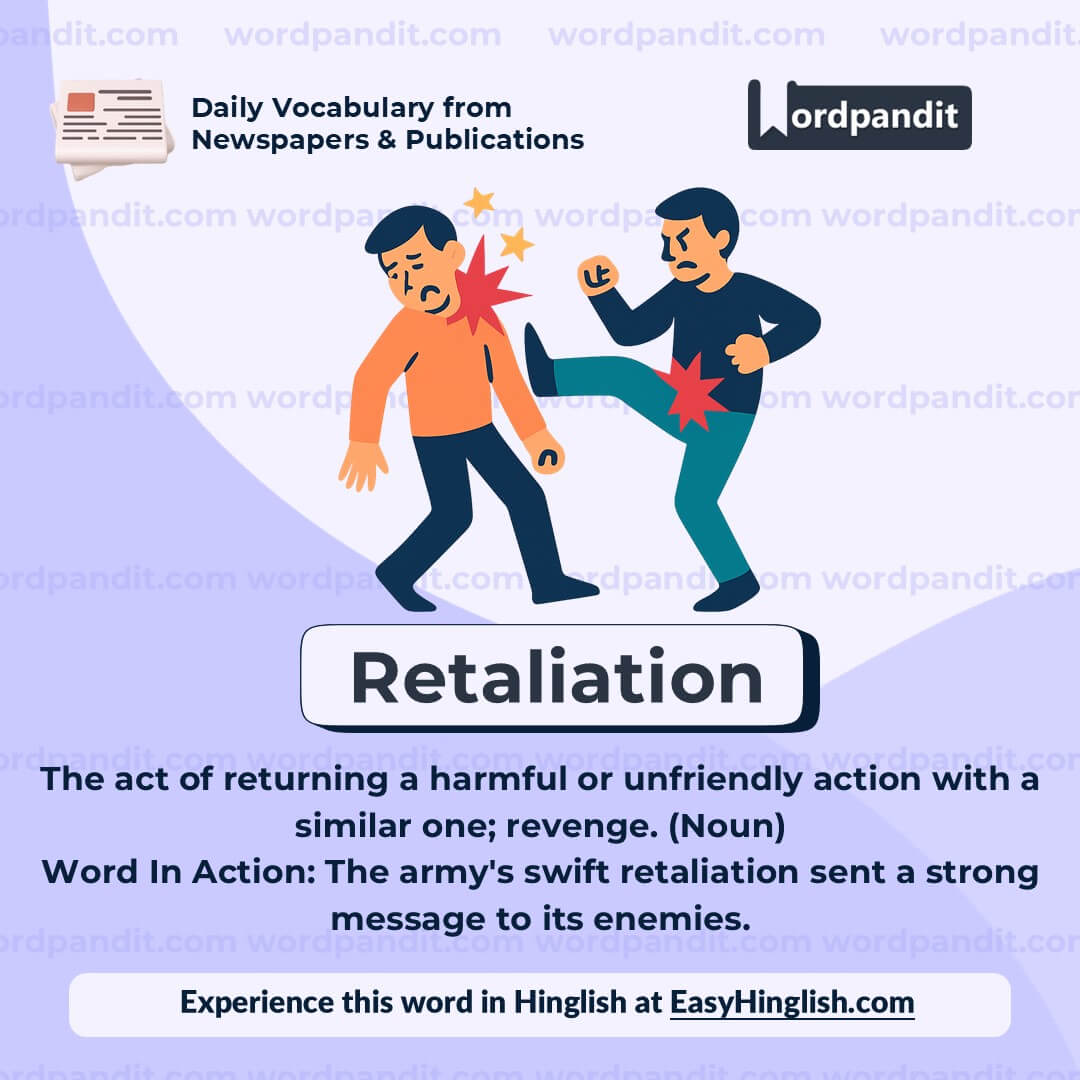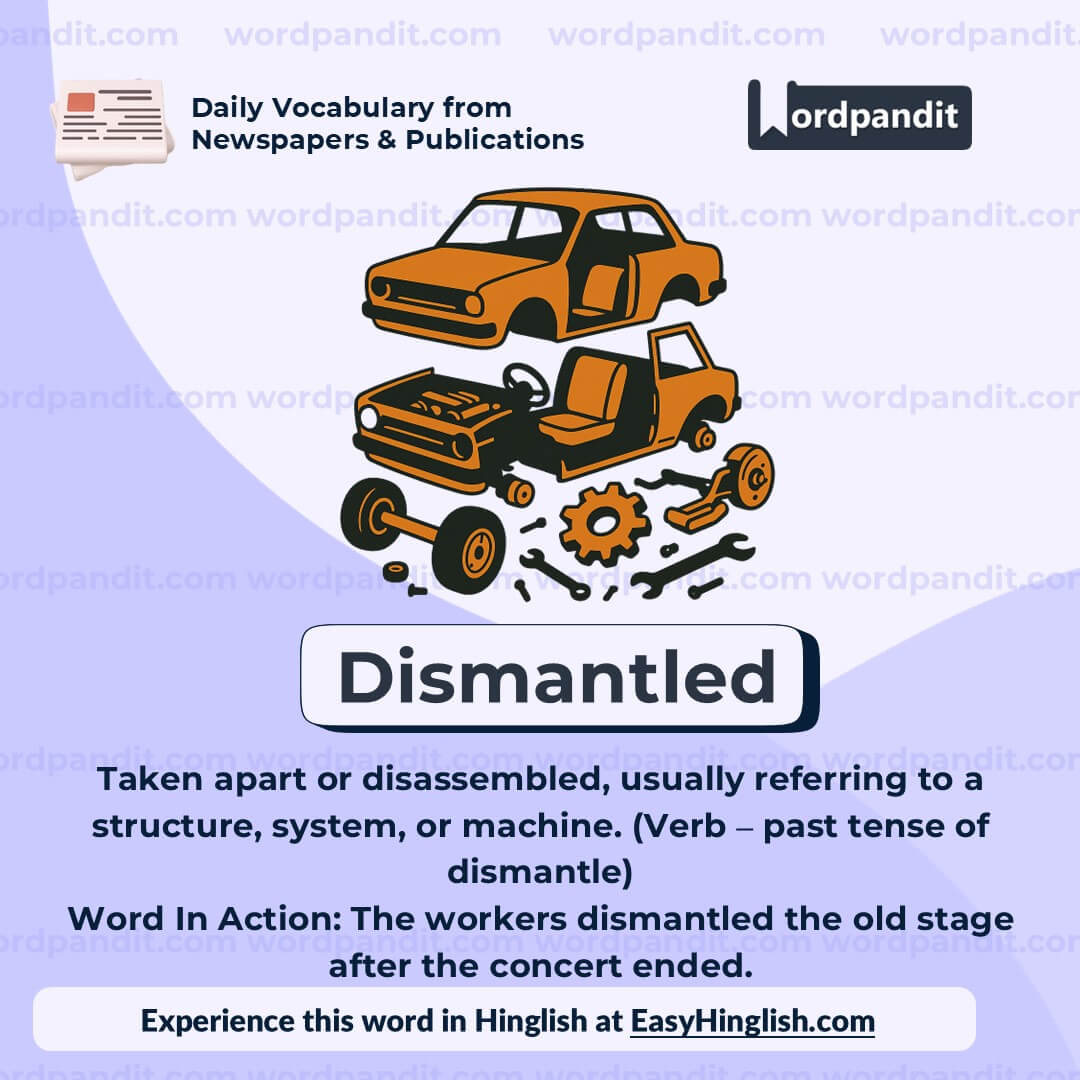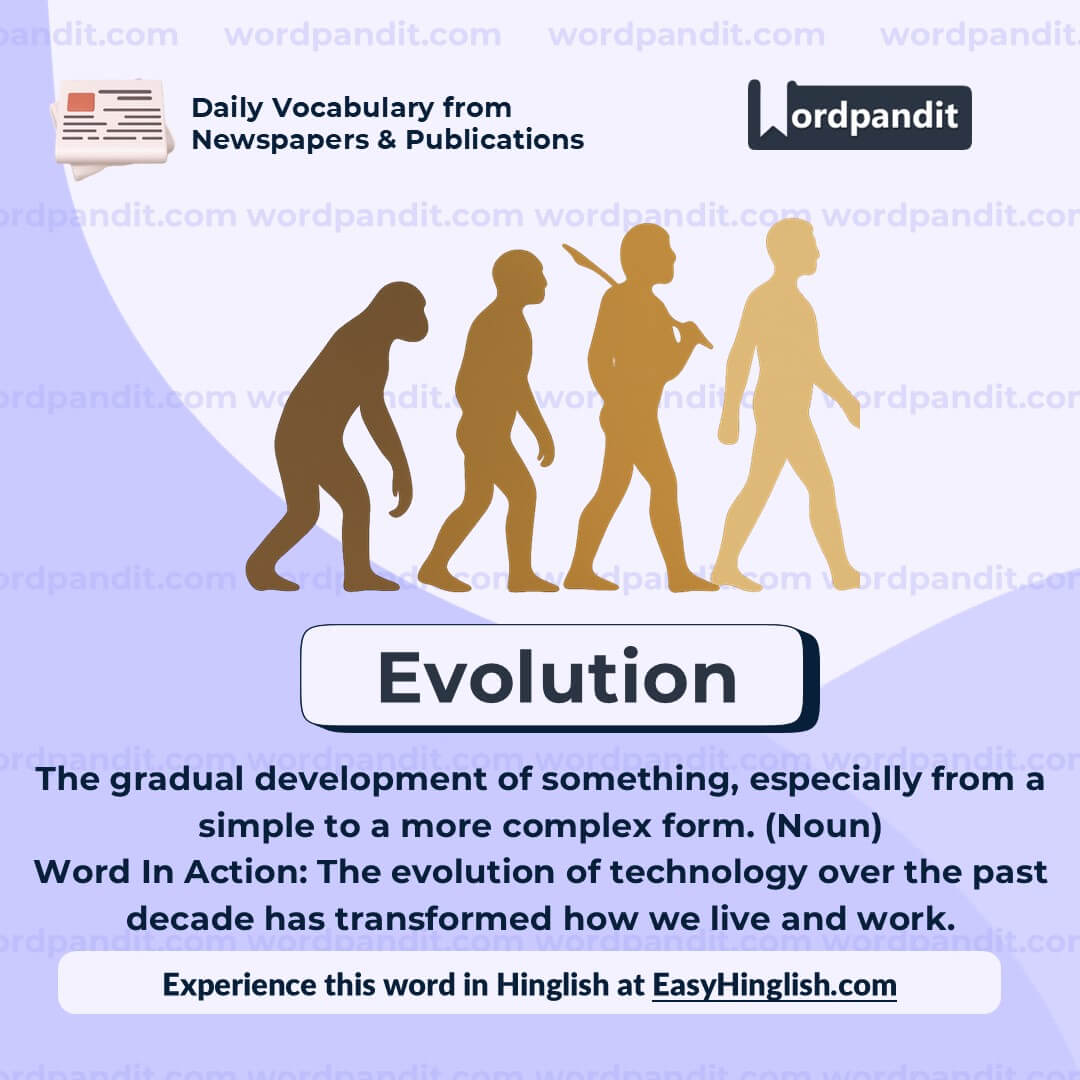Daily Vocabulary from Indian Newspapers and Publications
Welcome to Wordpandit’s Indian Vocabulary Hub
At Wordpandit, we understand the importance of staying rooted in the local context while expanding your language skills. This section focuses on enriching your vocabulary with words and phrases drawn from India’s leading newspapers and publications, ensuring you're learning vocabulary that is practical, relevant, and uniquely Indian.
Why Indian Sources Matter
We believe that the best way to master any language is by immersing yourself in local content. That’s why we carefully curate vocabulary from top Indian publications, including:
- The Hindu
- The Times of India
- The Economic Times
- Hindustan Times
- Live Mint
- The Indian Express
- And many others...
Stay Updated, Stay Relevant
With daily updates from Indian news sources, you’ll be consistently learning words that reflect the trends and shifts in Indian society and culture. Our focus is to provide vocabulary that enhances your understanding of the language in an Indian context.
How Wordpandit Supports Your Goals
Whether you’re preparing for exams, aiming to improve your professional communication, or simply want to stay connected with the latest Indian vocabulary, Wordpandit is here to guide you every step of the way.
Learn with a Practical Approach
Our interactive learning methodology includes real-world examples, engaging activities, and context-specific usage to ensure that every word becomes part of your active vocabulary.
Dive into Indian Vocabulary Today!
Why Choose Wordpandit?
Practical Learning: Focus on words you'll actually encounter in real-world reading, enhancing your comprehension and communication skills.
Diverse Content: From current affairs to scientific breakthroughs, our varied sources expose you to vocabulary across multiple domains.
Effortless Integration: Make Wordpandit a part of your daily routine. Just a few minutes each day can significantly boost your lexicon over time.
Your Path to Vocabulary Mastery
- Visit our Daily Vocabulary section regularly
- Explore new words and their usage in context
- Practice incorporating these words into your own writing and speech
- Track your progress as your vocabulary expands
Start Your Journey Today
Embark on your vocabulary enhancement journey with Wordpandit. By consistently engaging with our daily posts, you'll build a robust vocabulary that serves you well in academic, professional, and personal contexts.
Remember, a word a day keeps linguistic limitations at bay. Make Wordpandit your daily companion in the quest for vocabulary excellence!
WORD-1: Retaliation
Context:
"India, which got off relatively lightly with a 26% Trump tariff on Wednesday, was looking at $8-10bn in lost export earnings over six months. But China’s strong retaliation has increased uncertainty to a different level." – The Times of India
Explanatory Paragraph:
"Retaliation" refers to the act of responding to a harmful action with another harmful action. It often carries a sense of revenge or payback, especially in political, military, or personal conflicts. In this context, China responded strongly to tariffs imposed by the U.S., creating further tension and economic instability. Retaliation usually escalates a situation instead of resolving it, making it a critical term in global diplomacy and negotiations.
Meaning: The act of returning a harmful or unfriendly action with a similar one (noun)
Pronunciation: ruh-tal-ee-AY-shun
Difficulty Level: ⭐⭐⭐ Intermediate
Etymology: From Late Latin *retaliationem*, meaning “a returning in kind.” Derived from Latin *retaliare* (to pay back in kind).
Prashant Sir's Notes:
Understand this word in the context of international relations and personal conflicts. "Retaliation" always involves a reaction to a perceived wrong—usually with equal or greater force. Watch how nations use it as a policy tool.
Synonyms & Antonyms:
Synonyms: revenge, reprisal, retribution, payback, vengeance
Antonyms: forgiveness, reconciliation, peace, pardon
Usage Examples:
- The company’s retaliation against whistleblowers drew public criticism.
- He planned a quiet but calculated retaliation after the betrayal.
- In retaliation to the sanctions, the country cut off oil exports.
- The child’s retaliation to the bullying was to ignore the insults entirely.
Cultural Reference:
"An eye for an eye will only make the whole world blind." – Often attributed to Mahatma Gandhi, this quote warns against the cycle of retaliation.
Think About It:
Can retaliation ever lead to long-term peace, or does it always escalate conflict?
Quick Activity:
Write a short paragraph describing a fictional political conflict. Use the word "retaliation" at least once and try to highlight the consequences of the retaliatory act.
Memory Tip:
Think of "re- + talon"—like a hawk using its talons to strike back. Retaliation is striking back after being provoked.
Real-World Application:
"Retaliation" is commonly used in news reports, particularly in international relations, trade disputes, military actions, and even workplace dynamics. Understanding this term helps grasp how conflicts evolve and why strategic responses matter.
WORD-2: Dismantled
Context:
"On August 15, Nixon stunned the world by announcing the “temporary suspension” of the U.S. dollar’s convertibility into gold. This effectively dismantled the Bretton Woods framework that was worked out quite unilaterally in 1944, which led to the setting up of the World Bank and the International Monetary Fund." - The Hindu
Explanatory Paragraph:
"Dismantled" refers to the process of taking something apart, whether it’s a physical structure, a system, or a policy framework. In the given context, the Bretton Woods system—a foundational economic agreement shaping global finance—was effectively broken apart by Nixon’s policy move in 1971. When something is dismantled, it no longer functions as it originally did. This word is often used in both literal and metaphorical contexts to signify the deliberate or gradual removal of structures or systems.
Meaning: Taken apart or broken down into pieces; systematically ended or abolished (verb – past tense)
Pronunciation: dis-MAN-tuhld
Difficulty Level: ⭐⭐ Basic to Intermediate
Etymology: From Old French *desmanteler*, meaning "to strip of covering or armor," based on Latin *mantellum* (cloak). Originally meant to remove protective layers or structures.
Prashant Sir's Notes:
“Dismantled” is a key verb used to describe the systematic breakdown or removal of institutions, policies, or machinery. It is highly useful in academic writing and analysis of reforms, revolutions, or organizational change. Remember: if something is dismantled, it no longer functions in its original form.
Synonyms & Antonyms:
Synonyms: take apart, break down, abolish, remove, deconstruct
Antonyms: assemble, construct, build, establish, erect
Usage Examples:
- The government dismantled outdated labor laws to modernize the economy.
- The activists demanded that the surveillance infrastructure be dismantled.
- After years of corruption, the regime was finally dismantled by a democratic movement.
- He carefully dismantled the old radio to see how it worked inside.
Cultural Reference:
“Mr. Gorbachev, tear down this wall!” – Ronald Reagan (1987). The dismantling of the Berlin Wall became a global symbol of the fall of communism in Eastern Europe.
Think About It:
When a system is dismantled, what ensures that something better takes its place?
Quick Activity:
List three systems (educational, political, economic, etc.) you think could be improved if partially dismantled. Justify your answer in 1-2 sentences for each.
Memory Tip:
Think of “dis” as “apart” and “mantle” as a covering. So to dismantle is to take the covering—or structure—apart. Imagine peeling off the parts of a machine.
Real-World Application:
"Dismantled" is frequently used in discussions of reforms, regime changes, policy shifts, and institutional overhauls. Whether it's dismantling outdated rules or systems of oppression, the word captures pivotal transitions in society and governance.
WORD-3: Unilaterally
Context:
"On August 15, Nixon stunned the world by announcing the “temporary suspension” of the U.S. dollar’s convertibility into gold. This effectively dismantled the Bretton Woods framework that was worked out quite unilaterally in 1944, which led to the setting up of the World Bank and the International Monetary Fund." - The Hindu
Explanatory Paragraph:
"Unilaterally" means doing something by oneself without consulting or seeking agreement from others. It is typically used in political, diplomatic, or legal settings to describe actions taken by a single entity—usually a country or organization—without collaboration or consensus. In the context of the Bretton Woods system, it suggests that one party (the U.S.) made crucial decisions without involving other stakeholders. Such actions often generate controversy, as they bypass collective discussion or global cooperation.
Meaning: Performed by or affecting only one party, group, or country without the agreement of others (adverb)
Pronunciation: yoo-nih-LA-tuh-ruh-lee
Difficulty Level: ⭐⭐⭐ Intermediate
Etymology: From Latin *uni-* meaning "one" and *lateral* meaning "side"; literally, "one-sidedly". Entered English in the mid-19th century.
Prashant Sir's Notes:
This is a critical academic word used often in geopolitics, legal discourse, and diplomacy. "Unilaterally" implies power dynamics—it signals a decision made without mutual agreement. Keep an eye on this word when reading editorials or international news.
Synonyms & Antonyms:
Synonyms: independently, one-sidedly, autonomously, arbitrarily
Antonyms: bilaterally, mutually, collectively, cooperatively
Usage Examples:
- The president acted unilaterally to impose sanctions, bypassing Congress.
- She made the decision unilaterally without consulting her team.
- Many critics opposed the country’s plan to withdraw unilaterally from the agreement.
- Unilaterally changing the terms of a contract can lead to legal disputes.
Cultural Reference:
During the early 2000s, the U.S. was often accused of acting unilaterally in international conflicts, particularly during the Iraq War. This led to intense global debates on the importance of multilateral diplomacy.
Think About It:
Is it ever justified for a powerful nation to act unilaterally if it believes the greater good is at stake?
Quick Activity:
Write two short sentences: one where a person acts unilaterally in a school setting, and one where a government acts unilaterally in foreign policy.
Memory Tip:
Break it down: "Uni" (one) + "lateral" (side) = "one-sided". Think of a see-saw where only one side is moving—that’s unilateral action!
Real-World Application:
Understanding “unilaterally” is vital when analyzing international decisions, especially in news, diplomacy, or legal studies. It helps you recognize when decisions are made without consensus—often shaping global power dynamics.
WORD-4: Pinnacle
Context:
"Effective communication, it is widely believed, is among the most efficient tools in resolving human conflict. It takes people years of trial and error, maybe a therapist or two, to perfect the art. Yet, human beings have long held the arrogant belief that they are the pinnacle of evolution. Turns out, their close evolutionary cousins, bonobos, are also capable of complex meaning-making, previously thought of as a uniquely human ability." - The Indian Express
Explanatory Paragraph:
The word "pinnacle" refers to the highest point or the most successful, powerful, or important position in a field or process. It is often used to highlight achievement, success, or supremacy. In the provided context, humans have traditionally considered themselves the ultimate product—the highest point—of evolutionary development. However, this idea is challenged by discoveries that other species, like bonobos, may also share complex cognitive traits once thought to be uniquely human. "Pinnacle" suggests being at the very top—but that top isn't always as exclusive as it seems.
Meaning: The most successful point; the highest or most important level (noun)
Pronunciation: PIN-uh-kul
Difficulty Level: ⭐⭐ Basic to Intermediate
Etymology: From Latin *pinnaculum*, meaning “small wing” or “gable,” which evolved to refer to a high point or spire. It entered English through Old French in the 14th century.
Prashant Sir's Notes:
"Pinnacle" is often used metaphorically to describe peak achievement—be it in science, career, sports, or philosophy. Watch how it’s used to reflect pride or overconfidence, especially in contexts like the one here. Don’t forget, every peak has a perspective!
Synonyms & Antonyms:
Synonyms: peak, summit, apex, zenith, acme, climax
Antonyms: base, bottom, nadir, low point, depth
Usage Examples:
- Winning the Nobel Prize was the pinnacle of her scientific career.
- He stood at the pinnacle of political power, admired and feared in equal measure.
- The novel captures the emotional pinnacle of a life lived on the edge.
- Some argue that true wisdom lies in realizing that humans may not be the pinnacle of evolution after all.
Cultural Reference:
Mount Everest is often referred to as "the pinnacle of human endurance"—a metaphorical and literal peak, representing the extreme limits of physical and mental achievement.
Think About It:
If we no longer see ourselves as the pinnacle of evolution, how might that change our relationship with the natural world?
Quick Activity:
Write a sentence using the word "pinnacle" to describe a non-human achievement—such as a natural event, an animal behavior, or a technological advancement.
Memory Tip:
Think of a mountain peak shaped like a pin → “pinnacle” = the sharpest, highest point. Easy to remember: pin = peak = pinnacle!
Real-World Application:
"Pinnacle" is commonly used in motivational speeches, academic writing, business strategy, and journalism to highlight excellence or achievement. Understanding it helps frame goals and recognize when something or someone is at the top of their game.
WORD-5: Evolution
Context:
"Effective communication, it is widely believed, is among the most efficient tools in resolving human conflict. It takes people years of trial and error, maybe a therapist or two, to perfect the art. Yet, human beings have long held the arrogant belief that they are the pinnacle of evolution. Turns out, their close evolutionary cousins, bonobos, are also capable of complex meaning-making, previously thought of as a uniquely human ability." - The Indian Express
Explanatory Paragraph:
"Evolution" refers to the gradual process by which living organisms change and develop over generations, leading to the diversity of life forms we see today. It’s a fundamental biological concept explaining how species adapt to their environments through natural selection. In the given context, the word is used to express how humans view themselves as the highest product of this ongoing process. However, the discovery that bonobos also possess complex communication abilities challenges the idea of human supremacy in evolution. The term can also be applied metaphorically in personal growth, societal progress, or technological development.
Meaning: The gradual development of something, especially from a simple to a more complex form; in biology, the process by which different kinds of living organisms are thought to have developed from earlier forms (noun)
Pronunciation: ev-uh-LOO-shun / ee-vuh-LOO-shun
Difficulty Level: ⭐⭐ Basic to Intermediate
Etymology: From Latin *evolutio*, meaning “an unrolling, unfolding,” from *evolvere* (“to roll out” or “unfold”). The biological sense was popularized in the 19th century following Darwin’s work.
Prashant Sir's Notes:
This is one of those must-know academic words. While its roots are in biology, “evolution” is now used across disciplines—from tech to sociology. Always notice whether the word is being used in its literal scientific sense or as a metaphor for change and progress.
Synonyms & Antonyms:
Synonyms: development, progression, growth, transformation, advancement
Antonyms: stagnation, regression, decline, deterioration
Usage Examples:
- Darwin’s theory of evolution revolutionized our understanding of biology.
- Technology has gone through rapid evolution in the last two decades.
- The evolution of language mirrors the evolution of human society.
- Her mindset has gone through a quiet evolution after years of reflection and reading.
Cultural Reference:
Charles Darwin’s *On the Origin of Species* (1859) is one of the most influential works in scientific history, laying the foundation for the modern understanding of evolution through natural selection.
Think About It:
How does our understanding of evolution shape the way we view ourselves—and our responsibilities—toward other species and the planet?
Quick Activity:
Use "evolution" in two different contexts: one scientific, one metaphorical. Example: "The evolution of mammals" and "the evolution of social norms."
Memory Tip:
Think of "evolution" as something “unfolding” over time—like a story slowly revealing itself chapter by chapter. Evolution = slow and steady transformation.
Real-World Application:
"Evolution" is an essential concept in biology, but its broader use helps us describe growth in careers, societies, relationships, and even ideologies. It’s a go-to word for academic, philosophical, and popular writing alike.



















